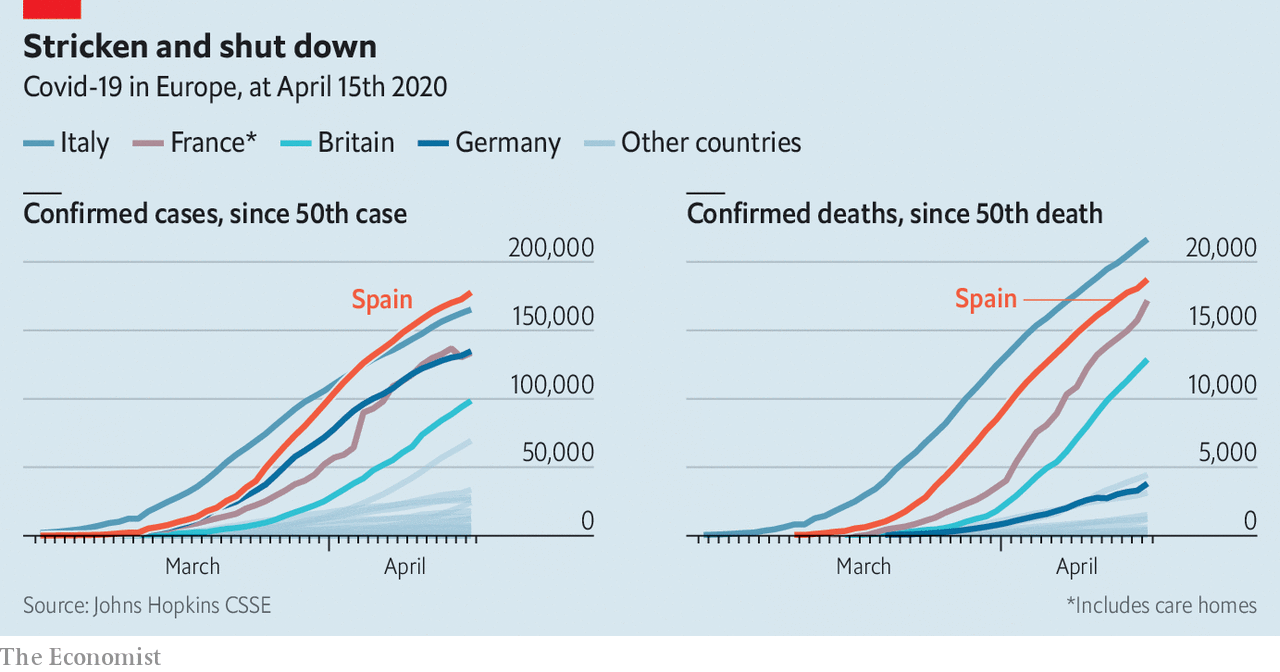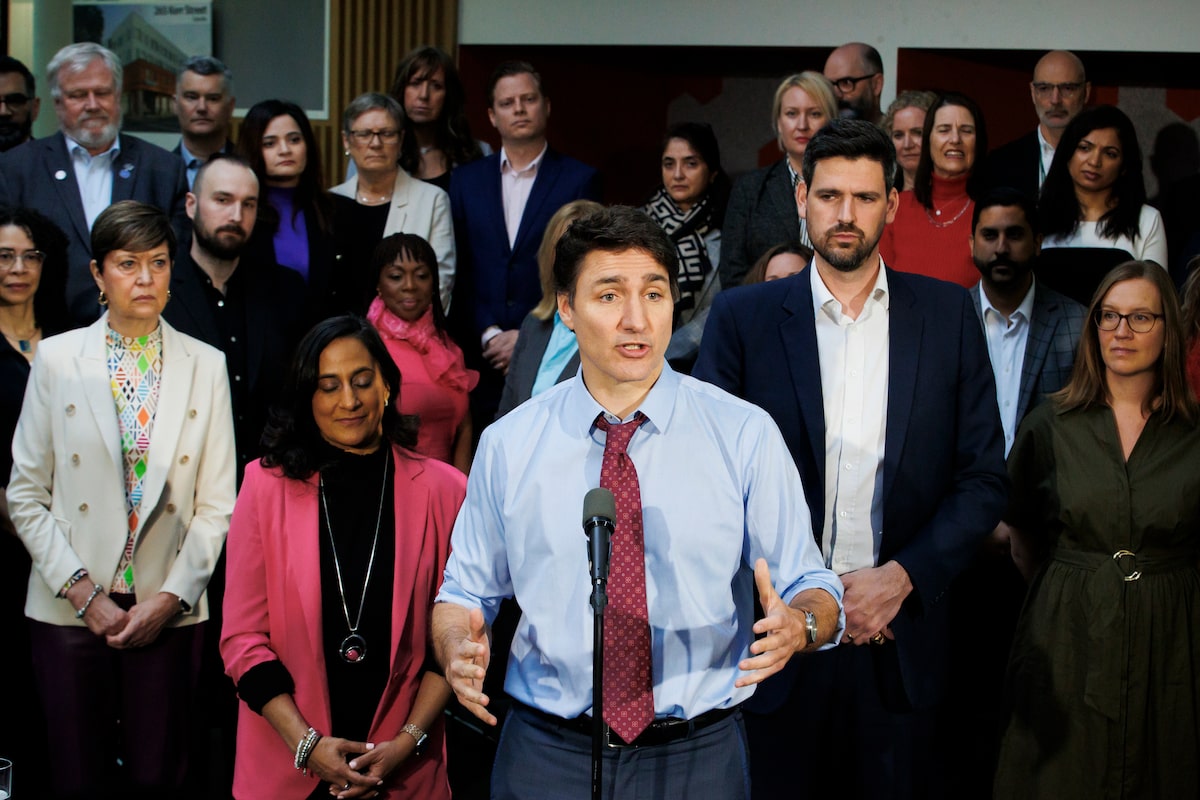Politics
Nasty politics returns to Spain – The Economist

Editor’s note: The Economist is making some of its most important coverage of the covid-19 pandemic freely available to readers of The Economist Today, our daily newsletter. To receive it, register here. For our coronavirus tracker and more coverage, see our hub
BACK LAST summer Pedro Sánchez, Spain’s Socialist prime minister, said that if he agreed to a coalition government with Podemos, a far-left outfit, “I wouldn’t sleep at night.” After another indecisive election—the fourth in four years—he formed just such a coalition, which took office in January. Weeks later Spain was laid low by the novel coronavirus, and the novel minority coalition is struggling to cope, leaving the prime minister scrambling for broader support.
Mr Sánchez’s decision to impose a state of emergency and lockdown on March 14th, centralising command of health care and security in the national government, received widespread public and political backing. Five weeks on, the hospitals are no longer overflowing and the peak of the epidemic has passed, for now at least. The government is starting to think, gingerly, about how and when to get the country back to work (see article). But the toll has been heavy. By April 16th 18,812 people had died, according to official figures. The economy is in meltdown: 900,000 jobs were lost in March alone, some 3.5m workers are furloughed, and the IMF forecasts that Spain’s GDP will contract by 8% this year, the second-biggest fall in Europe after Italy.
The government must deal with all this with a slender stock of political capital. During the lockdown public opinion has been volatile. Approval for the government’s handling of the virus fell from 64% to 39% during March, according to Metroscopia, a pollster. Much of the opposition has broken ranks. Vox, a hard-right party with 52 of the 350 seats in Congress, wants a “national emergency government” of technocrats. Pablo Casado, the leader of the mainstream conservative People’s Party (PP), has accused Mr Sánchez of “arrogance, incompetence and lies”. This contrasts with the rallying round seen in many other European countries.
Mr Sánchez has responded by calling for a “pact for national reconstruction”, in theory involving the opposition, regional governments, businesses and unions. This is a conscious echo of the Moncloa Pacts of 1977, a set of agreements on economic measures between government and opposition which were a pillar of Spain’s transition from dictatorship to democracy. One poll found 92% in favour of another such pact—but 79% thought it improbable.
One explanation for the government’s difficulties is its own shortcomings, both technical and political. It bungled an announcement on March 28th that the lockdown would temporarily tighten, leaving many vital details initially uncertain. It is harder to co-ordinate such measures in a decentralised country with powerful regional governments. Even so, Mr Sánchez’s practice has been to pre-announce measures, and to consult only after their implementation. That has left businesses and some regional presidents fuming. “It’s a government that lacks not just experience but also deep knowledge of the state and how it works,” says a former senior official. “The sense of improvisation is very strong.”
Podemos and its leader, Pablo Iglesias, have added to the problems. Perhaps with some justification, he has seemed desperate to leave his ideological mark on government policy. At his instigation the government issued a decree making sackings during the pandemic unlawful, even as it has forced many businesses to suspend trading. Mr Iglesias’s hostility to the private sector and the monarchy (and the Moncloa Pacts) arouses widespread mistrust. The government finds it hard to speak with one voice; Mr Sánchez has had to devote much time and effort to internal debate.
Governments everywhere have struggled to deal with a crisis that demands swift, momentous and costly decisions. In Spain, a fragmented opposition adds to the problems. “We’re not starting from a blank slate, but rather from years of institutional deterioration,” says Sandra León, a political scientist. The country’s political system has not regained its balance since the last economic slump, of 2008-12, which fractured a stable two-party system into five and fuelled separatism in Catalonia.
Political competition is now not just between left and right but within each of those two blocs, which makes it more confrontational. Take Mr Casado’s position. He heads what was once the loyal opposition, but he must now also try to contain Vox. Another battleground will be over decentralisation. Quim Torra, the separatist head of the Catalan administration, has attempted to exploit the crisis to claim that independence would have provided more protection against the virus. Since he still runs nursing homes and hospitals in his region, that has cut little ice. Rather, there is evidence from polling data that in this crisis Spaniards want the centre to take charge as Mr Sánchez has done, argues Ms León. But that is inimical to the moderate and influential Basque nationalists, as well as to their Catalan counterparts.
Some in the PP say that one condition for a national agreement should be the departure of Podemos from the government. Mr Sánchez has ruled that out. Although it was his route to office, he knew the tie to Podemos “wouldn’t work for governing”, says Jorge del Palacio of King Juan Carlos University in Madrid. But “he can’t break the coalition without an alternative.” A centrist grand coalition looks unlikely, though it is not impossible. The coming months of mass unemployment, business failures and spiralling public debt will be gruelling for Spain and for its government. The last crisis upended the country’s politics in unforeseen ways. This one could yet do so, too. ■
Dig deeper:
For our latest coverage of the covid-19 pandemic, register for The Economist Today, our daily newsletter, or visit our coronavirus tracker and story hub
This article appeared in the Europe section of the print edition under the headline “A house divided”
Politics
Trudeau questions Poilievre's judgment, says the Conservative Leader 'will do anything to win' – The Globe and Mail


Prime Minister Justin Trudeau is flanked by Minister of Housing Sean Fraser, right, and Treasury Board President Anita Anand, left, during a press conference in Oakville, Ont., on April 24.Cole Burston/The Canadian Press
Prime Minister Justin Trudeau criticized Pierre Poilievre over his judgment, a day after the Conservative Leader visited a protest against carbon pricing that featured a “Make Canada Great Again” slogan and a symbol that appeared to be tied to a far-right, anti-government group.
Mr. Trudeau accused Mr. Poilievre of exacerbating divisions and welcoming the “support of conspiracy theorists and extremists.”
“Every politician has to make choices about what kind of leader they want to be,” the Prime Minister said at a press conference Wednesday in Oakville, Ont.
“He will do anything to win, anything to torque up negativity and fear and it only emphasizes that he has nothing to say to actually solve the problems that he’s busy amplifying.”
On Tuesday, Mr. Poilievre stopped at a protest against carbon pricing near the New Brunswick-Nova Scotia border while on his way from PEI to Nova Scotia. Video of the protest shows an expletive-laden flag directed at Mr. Trudeau that was a symbol of the anti-vaccine-mandate protests that gripped Ottawa two years ago, as well as an anti-carbon-tax sign and a van with the slogan “Make Canada Great Again” written on it.
“We saw you so I told the team to pull over and say ‘hello,’” Mr. Poilievre said to the protesters in one of the videos posted online. He thanked them for “all you’re doing.”
“We’re going to axe the tax and its going to be in part because you guys fought back,” Mr. Poilievre said in the videos. “Everyone hates the tax because everyone’s been screwed over. People believed his lies. Everything he said was bullshit, from top to bottom.”
When asked to take a picture in front of the flag with the expletive, Mr. Poilievre responded: “Let’s do it in front of something else.”
One of the vans at the protests has what appeared to be a symbol of the anti-government, far-right group called Diagolon. Mr. Trudeau tried on Wednesday to tie that to Mr. Poilievre. The Conservative Leader has previously disavowed the group.
In a statement Wednesday through his lawyer, the group’s leader, Jeremy MacKenzie, said he was Mr. Poilievre’s biggest detractor in Canada. He also criticized Mr. Trudeau, saying “both of these weak men are completely out of touch with reality and incapable of telling the truth.”
Mr. Poilievre’s office defended the Conservative Leader’s visit to the protest in a statement on Wednesday.
“As a vocal opponent of Justin Trudeau’s punishing carbon tax which has driven up the cost of groceries, gas and heating, he made a brief, impromptu stop,” spokesperson Sebastian Skamski said.
“If Justin Trudeau is concerned about extremism, he should look at parades on Canadian streets openly celebrating Hamas’ slaughter of Jews on October 7th.”
During his press conference, Mr. Trudeau also pointed out that Mr. Poilievre has done nothing to reject the endorsement of right-wing commentator Alex Jones earlier this month. Mr. Jones, on X, called Mr. Poilievre “the real deal” and said “Canada desperately needs a lot more leaders like him and so does the rest of the world.”
Mr. Jones was ordered to pay nearly $1-billion in damages to the families of the victims of the deadly 2012 Sandy Hook school shooting, which he portrayed as a hoax.
“This is the kind of man who’s saying Pierre Poilievre has the right ideas to bring the country toward the right, towards conspiracy theories, towards extremism, towards polarization,” Mr. Trudeau said.
In response to the Prime Minister’s remarks, Mr. Skamski said “we do not follow” Mr. Jones “or listen to what he has to say.”
“Common-sense Conservatives are listening to the priorities of the millions of Canadians that want to axe the tax, build the homes, fix the budget and stop the crime,” he added.
“It is the endorsement of hard-working, everyday Canadians that Conservatives are working to earn. Unlike Justin Trudeau, we’re not paying attention to what some American is saying.”
With a report from The Canadian Press.
Politics
Politics Briefing: Younger demographics not swayed by federal budget benefits targeted at them, poll indicates

|
|
Hello,
The federal government’s efforts to connect with Gen Z adults and millennials through programs in last week’s federal budget has not yet worked, says a new poll.
The Angus Reid Institute says today that the opposition Conservatives are running at 43 per cent voter support compared to 23 per cent for the governing Liberals, while the NDP are at 19 per cent.
Polling by the institute also finds the Liberals are the third choice among Gen Z and millennial voters, falling behind the NDP and Conservatives.
According to the institute, Conservative Leader Pierre Poilievre is viewed more positively among Gen Z adults than Prime Minister Justin Trudeau, with Poilievre at 29 per cent approval and Trudeau at 17 per cent. Poilievre also has a higher favorability than Trudeau’s approval among younger and older millennials.
Gen Z adults were born between 1997 and 2012, while the birth period of millennials was 1981 to 1996.
The poll conclusions are based on online polling conducted from April 19 – three days after the budget was released – to April 23, among a randomized sample of 3, 015 Canadians. Such research has a probability sample of plus or minus two percentage points, 19 times out of 20.
Asked about the poll today, Trudeau said the budget is aimed at solving problems, helping young people and delivering homes and services such as child care.
“I am confident that as Canadians see these measures happening, they will be more optimistic about their future, the way we need them to be,” Trudeau told a news conference in Oakville, Ont.
He also said he expected Canadians to be thoughtful about the future when they vote. “I trust Canadians to be reasonable,” he said.
The Globe and Mail has previously reported that Trudeau’s government has set an internal goal of narrowing the Conservative Party’s double-digit lead by five points every six months. A federal election is expected next year.
This is the daily Politics Briefing newsletter, written by Ian Bailey. It is available exclusively to our digital subscribers. If you’re reading this on the web, subscribers can sign up for the Politics newsletter and more than 20 others on our newsletter sign-up page. Have any feedback? Let us know what you think.
TODAY’S HEADLINES
Pierre Poilievre visits convoy camp, claims Trudeau is lying about ‘everything’: CBC reports that the Conservative Leader is facing questions after stopping to cheer on an anti-carbon tax convoy camp near the border between New Brunswick and Nova Scotia, where he bluntly accused Prime Minister Justin Trudeau of lying about “everything.”
Smith defends appointment of task force led by doctor skeptical of COVID-19 measures: The Globe and Mail has published details of the little-known task force that was given a sweeping mandate by the government to assess data used to inform pandemic decision-making. Story here.
Canadians should expect politicians to support right to bail, Arif Virani’s office says: The office of Canada’s Justice Minister says, warning that “immediate” and “uninformed reactions” only worsens matters.
Parti Québécois is on its way back to the centre of Quebec politics: The province’s next general election isn’t until 2026, a political eternity away, and support for separating from Canada remains stagnant. But a resurgent Quebec nationalism, frustration with Ottawa, and the PQ’s youthful, upbeat leader Paul St-Pierre Plamondon have put sovereignty back on the agenda.
Anaida Poilievre in B.C.: The wife of the federal Conservative Leader has been on a visit to Kelowna in recent days that was expected to conclude today, according to Castanet.net.
Ontario to do away with sick note requirement for short absences: The province will soon introduce legislation that, if passed, will no longer allow employers to require a sick note from a doctor for the provincially protected three days of sick leave workers are entitled to.
Australian reporter runs into visa trouble in India after reporting on slaying of Canadian Sikh separatist: In a statement, the New York-based Committee to Protect Journalists said Indian authorities should safeguard press freedom and stop using visa regulations to prevent foreign journalists covering sensitive subjects.
Canadian military to destroy 11,000 Second World War-era pistols: The Ottawa Citizen reports that the move comes as the Canadian Forces confirmed it has received the final deliveries of a new nine-millimetre pistol as part of a $19.4-million project.
B.C. opposition leader in politics-free oasis: The first hint that there may be more to Kevin Falcon, leader of the official opposition BC United party, than his political stereotype comes when you pull up to his North Vancouver home – a single-level country cottage rancher dwarfed on one side by large, angular, modern monstrosity. A NorthernBeat profile.
TODAY’S POLITICAL QUOTES.
“Having an argument with CRA about not wanting to pay your taxes is not a position I want anyone to be in. Good luck with that Premier Moe.” – Prime Minister Justin Trudeau on the Canada Revenue Agency weighing in on Saskatchewan’s government move to stop collecting and remitting the federal carbon levy.
“That’s not something that we’re hoping for. We’re not trying to plan for an election.“ – NDP Leader Jagmeet Singh, at a news conference in Edmonton today, on the possibilities of an election now ahead of the vote expected in the fall of 2025.
THIS AND THAT
Commons, Senate: The House of Commons is on a break until April 29. The Senate sits again April 30.
Deputy Prime Minister’s day: In the Newfoundland and Labrador city of Mount Pearl, Chrystia Freeland held an event to talk about the federal budget.
Ministers on the road: Cabinet efforts to sell the budget continue, with announcements largely focused on housing. Citizens’ Services Minister Terry Beech and Small Business Minister Rechie Valdez are in Burnaby, B.C. Defence Minister Bill Blair is in Yellowknife. Employment Minister Randy Boissonnault is in Edmonton. Environment Minister Steven Guilbeault, Industry Minister François-Philippe Champagne and Natural Revenue Minister Marie-Claude Bibeau are in the Quebec city of Trois-Rivières.
Indigenous Services Minister Patty Hajdu is in Lytton, B.C., with an additional event welcoming members of the Skwlāx te Secwepemcúl̓ecw band to four new subdivisions built after the 2023 Bush Creek East wildfire. International Development Minister Ahmed Hussen is in Sault Ste. Marie. Foreign Affairs Minister Mélanie Joly is in Québec City. Diversity Minister Kamal Khera is in Kingston, Ontario. Immigration Minister Marc Miller and Tourism Minister Soraya Martinez Ferrada are in Whitehorse. Justice Minister Arif Virani and Families Minister Jenna Sudds are in North York, Ont. Veterans Affairs Minister Ginette Petitpas Taylor is in Charlottetown.
Meanwhile, International Trade Minister Mary Ng is in South Korea leading a group of businesses and organizations through to tomorrow.
GG in Saskatchewan: Mary Simon and her partner, Whit Fraser, on the last day of their official visit to Saskatchewan, is in Saskatoon, with commitments that include visiting the Maternal Care Centre at the Jim Pattison Hospital and meeting with Indigenous leaders.
Ukraine needs more military aid, UCC says: The Ukrainian Canadian Congress says Canada should substantially increase military assistance to Ukraine. “As President Zelensky stated, “The key now is speed,’” said a statement today from the organization. The appeal coincides with U.S. President Joe Biden signing into law an aid package that provides over US$61-billion in aid for Ukraine. “We call on the Canadian government and all allies to follow suit and to immediately and substantially increase military assistance to Ukraine,” said the statement. An update issued on the occasion of Prime Minister Justin Trudeau’s February visit to Ukraine noted that, since Russia invaded Ukraine in 2022, the Canadian government has provided $13.3-billion to Ukraine.
New chief commissioner of the Canadian Grain Commission: David Hunt, most recently an assistant deputy minister in Manitoba’s environment department, has been named to the post for a four-year term by Agriculture Minister Lawrence MacAulay.
PRIME MINISTER’S DAY
In Oakville, near Toronto, Justin Trudeau talked about federal-budget housing measures, and took media questions.
LEADERS
Bloc Québécois Leader Yves-François Blanchet is in the Quebec city of Victoriaville, with commitments that include a meeting at the Centre for Social Innovation in Agriculture
Green Party Leader Elizabeth May, in the Vancouver Island city of Nanaimo, attended the sentencing of deputy party leader Angela Davidson, also known as Rainbow Eyes, convicted of seven counts of criminal contempt for her participation in the Fairy Creek logging blockades on Vancouver Island.
NDP Leader Jagmeet Singh, in Edmonton, held a media availability.
No schedule released for Conservative Party Leader Pierre Poilievre.
THE DECIBEL
James Griffiths, The Globe’s Asia correspondent, is on the show t to discuss Article 23 – a new national security law in Hong Kong that includes seven new offences related to sedition, treason and state secrets that is expected to have a chilling effect on protest. The Decibel is here.
OPINION
The Liberals’ capital-gains tax hike punishes prosperity
“In her budget speech this month, Finance Minister Chrystia Freeland pointed to 1980s-era tax changes by the Progressive Conservative government of Brian Mulroney as a precedent for boosting the tax take on capital gains. … If one were to leave it at that, the Liberals come off quite well, having decided to boost the inclusion rate for capital gains – the amount subject to tax – to two-thirds, well below that of the latter years of the Mulroney government. But Ms. Freeland was only telling half the story.” – The Globe and Mail Editorial Board
The Liberals weight-loss goal shows they are running out of options
“The bad polls are weighing down the Liberals, so they have decided to shed some weight: They aim to cut the Conservatives’ lead by five percentage points by July. Like middle-aged dieters beginning a new regime, they’ve looked in the mirror and decided they have to do something. They’ve committed to it, too.” – Campbell Clark
Fear the politicization of pensions, no matter the politician
“Alberta Premier Danielle Smith and federal Finance Minister Chrystia Freeland don’t have a lot in common. But they do share at least one view: that governments could play a bigger role directing pension investments to the benefit of domestic industries and economic priorities. Canadians, no matter who they vote for, should be worried that these two political heavyweights share any common ground in this regard.” – Kelly Cryderman
The failure of Canada’s health care system is a disgrace – and a deadly one
“What can be said about Canada’s health care system that hasn’t been said countless times over, as we watch more and more people suffer and die as they wait for baseline standards of care? Despite our delusions, we don’t have “world-class” health care, as our Prime Minister has said; we don’t even have universal health care. What we have is health care if you’re lucky, or well connected, or if you happen to have a heart attack on a day when your closest ER is merely overcapacity as usual, and not stuffed to the point of incapacitation.” – Robyn Urback





Politics
Pecker’s Trump Trial Testimony Is a Lesson in Power Politics


|
|
David Pecker, convivial, accommodating and as bright as a button, sat in the witness stand in a Manhattan courtroom on Tuesday and described how power is used and abused.
“What I would do is publish positive stories about Mr. Trump,” the former tabloid hegemon and fabulist allowed, as if he was sharing some of his favorite dessert recipes. “And I would publish negative stories about his opponents.”





-
News22 hours ago
Amid concerns over ‘collateral damage’ Trudeau, Freeland defend capital gains tax change
-
Art19 hours ago
The unmissable events taking place during London’s Digital Art Week
-



 Politics23 hours ago
Politics23 hours agoHow Michael Cohen and Trump went from friends to foes
-



 Real eState24 hours ago
Real eState24 hours agoBlending Function and Style: The Best Garage Door Designs for Contemporary Homes
-
News23 hours ago
U.K. tabloids abuzz with Canadian’s ‘Loch Ness monster’ photo
-



 Politics22 hours ago
Politics22 hours agoPolitics Briefing: Saskatchewan residents to get carbon rebates despite province’s opposition to pricing program
-
News21 hours ago
What is a halal mortgage? How interest-free home financing works in Canada
-
Economy19 hours ago
German Business Outlook Hits One-Year High as Economy Heals









